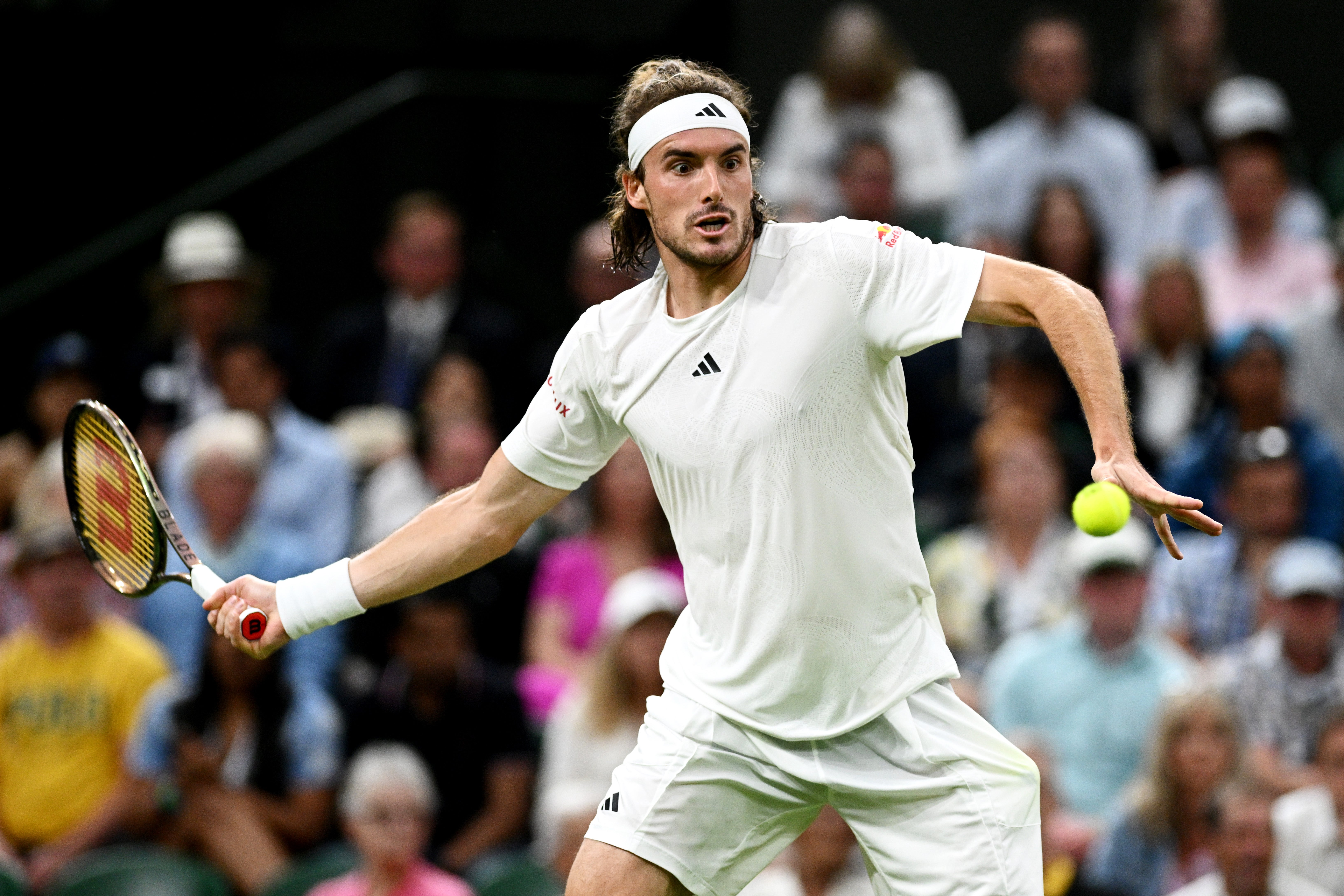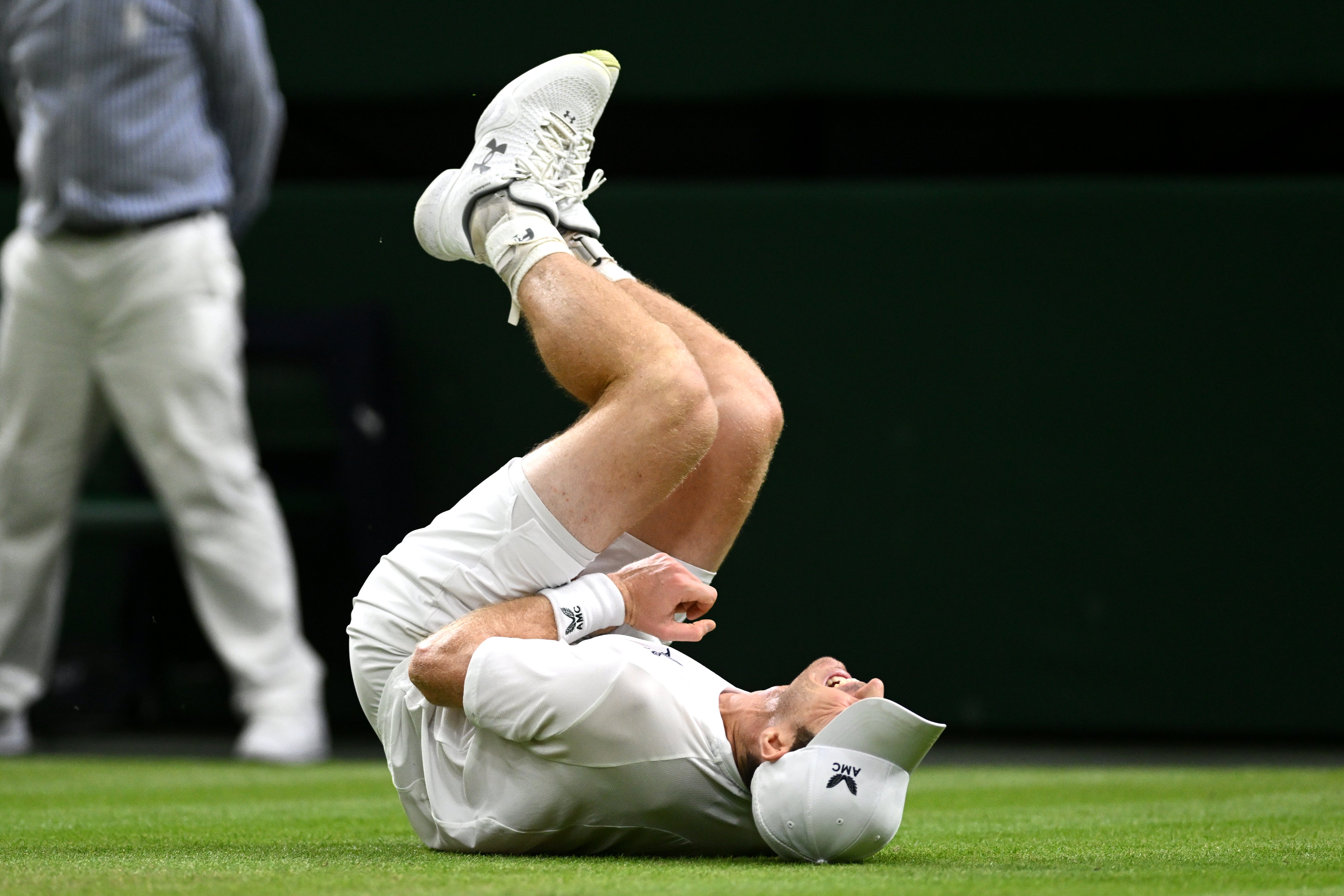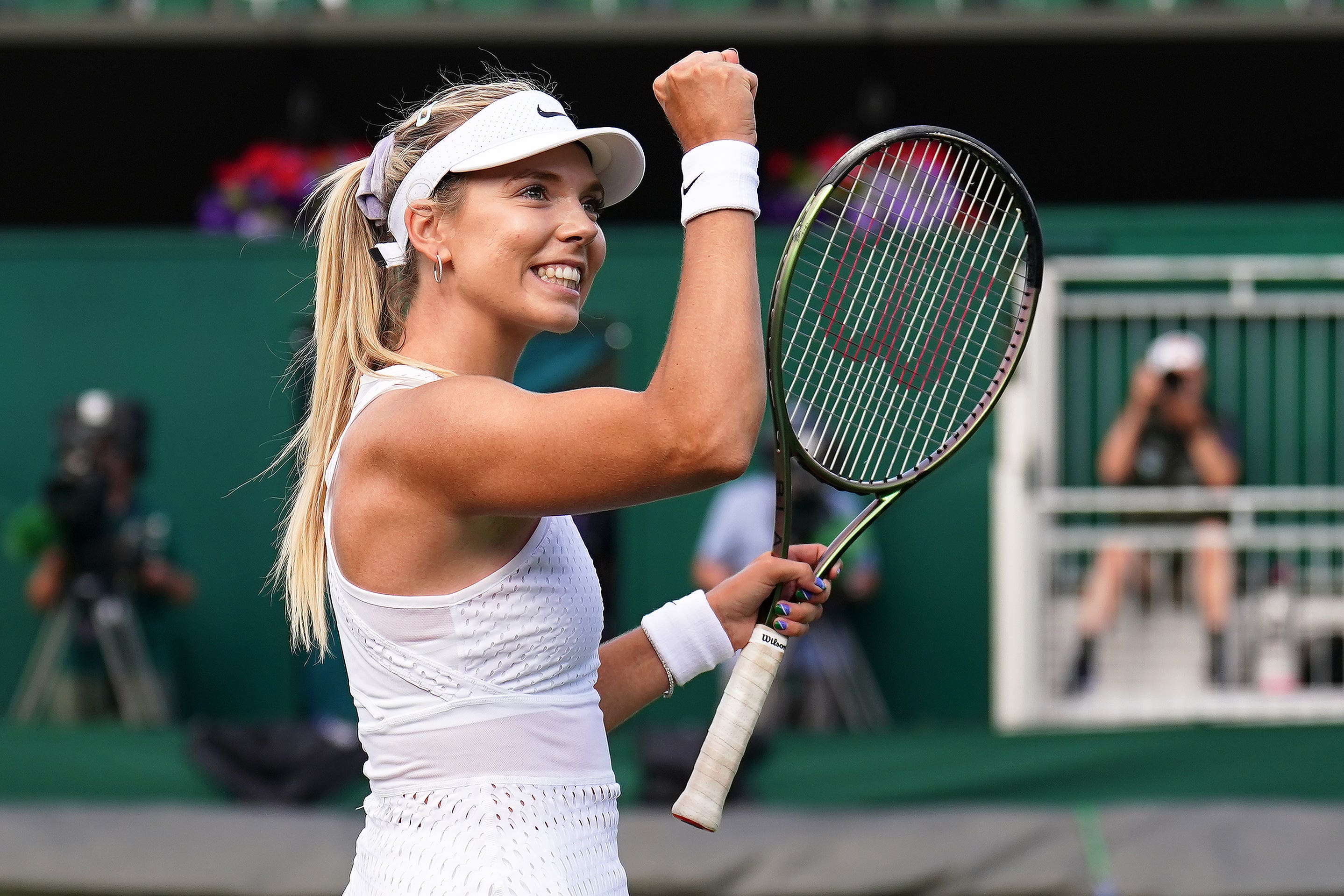Andy Murray thrills in latest Wimbledon epic, but this time there’s a twist
The two-time champion’s clash with Stefanos Tsitsipas was paused as curfew loomed, with the Scot leading by two sets to one

Your support helps us to tell the story
From reproductive rights to climate change to Big Tech, The Independent is on the ground when the story is developing. Whether it's investigating the financials of Elon Musk's pro-Trump PAC or producing our latest documentary, 'The A Word', which shines a light on the American women fighting for reproductive rights, we know how important it is to parse out the facts from the messaging.
At such a critical moment in US history, we need reporters on the ground. Your donation allows us to keep sending journalists to speak to both sides of the story.
The Independent is trusted by Americans across the entire political spectrum. And unlike many other quality news outlets, we choose not to lock Americans out of our reporting and analysis with paywalls. We believe quality journalism should be available to everyone, paid for by those who can afford it.
Your support makes all the difference.When looking down upon Centre Court, it is easy to construe the surface as some unearthly plain, to see the players who glide across it as some otherworldly beings. But truthfully, these are just people, and this is (glance over your shoulder, whisper it to a trusted friend) just grass.
In that same vein, Sir Andy Murray is merely a man. His faults prove that, even if his feats belie it. His clanging metal hip is a manmade accessory, not an astral invention. His brain ponders the ideal timing of a forehand and what awaits for dinner, not the bewildering basis of human existence and its place in the cosmos. Murray, like us, is human, no matter how many miracles he conjures on court. That is the reality.
Yet on the fourth night of Wimbledon, reality flickered in front of the Centre Court crowd and fizzled into something else altogether. This addictive, augmented reality read: ‘Andy Murray 6-7, 7-6, 6-4 Stefanos Tsitsipas.’
Nine years and 364 days after his first glorious moment on this very court, when he finally lifted the Wimbledon trophy to vanquish years of personal hurt and decades of national disappointment, a 36-year-old Murray took to the striped turf for a second-round clash with the world No 5. In many ways, that title win in 2013 – the first of two for Murray at the grass-court slam – rendered any future hopes and expectations null and void; at this point, if the Scot falls short at Wimbledon, it is a shame but not a tragedy. Fans will always have 2013, they will always have 2016.
They may yet have 2023.
A Murray match under the roof and lights on Centre Court belongs to a special strand of historic Wimbledon atmosphere. It was a strand extended here, even though the result is unwritten.
The earliest signs were concerning for Murray. First, Tsitsipas whipped a forehand passing shot beyond the hopping Scot. Then the 24-year-old slammed down an irretrievable serve, before guiding a backhand winner up the line. As Murray battled to hold serve in the next game, he was playing like an athlete who had been through a heavy, five-set clash the night before – only that was not Murray but the man across the net. And within five games, the man across the net had struck four aces and eight winners. As the set progressed, Murray stayed within touch, though Tsitsipas’s forehands and serves were securing easy points.

For Murray, the points were just that bit more difficult to win. It’s the sort of margin that can widen as a match wears on, but the two-time champion kept its columns close. Despite an ill-timed blip, Murray was able to fight back at 4-5, snarling for the obliging crowd’s support as he held serve for 5-5. A dominant hold ensued for Tsitsipas, before Murray toiled for his own, setting up a nerve-shredding tiebreak. For Tsitsipas, that brutal serve and Spitfire forehand proved decisive. They embodied much of the Greek’s good work in the second frame, too, though his backhand betrayed him on occasion.
And after each ace, drop shot and wrong-footing forehand, there was a resigned plod from Murray – not resignation to defeat, but acceptance that the chases he once embarked upon belong to the past. Off came his cap, Murray swatting it at the air in frustration, as if his surroundings were conspiring against him. Still he fought, as is his nature, driving his shots as much as his hips would allow, covering as much ground as his feet could consume. There were more ferocious appeals to the crowd, and ferocious appeals to himself.
It all led to another tiebreak, which Murray navigated with startling ease. When Murray sealed the set, he punctuated the feat with a battle cry and an emphatic series of fist pumps. The fans lapped it up. They always have. They always will. In contrast, they jeered Tsitsipas when the fifth seed emerged late for the third set, not forgetting his seven-minute bathroom break in the players’ frosty US Open meeting two years ago. Was Tsitsipas fazed? He immediately surrendered a break of serve to love. Cue more rapturous applause.

In the third set, Murray’s serve was oppressive, and the Scot was making shots he had no right to make. He was winning games he had no right to win. Before long, he had won a set he had no right to win.
In the seconds before he did so, however, there was a scare. As Tsitsipas found the corner with a groundstroke, Murray pulled up on the spot. His agony was audible, and he hit the ground, clutching his groin. Tension spread around Centre Court, but the Briton allayed it by finally standing and finishing the task.
Not, however, the final task. The umpire announced that, with 20 minutes until curfew, the match would be put on pause until Friday. The was to be no repeat of 2012, when Murray was allowed to breach the curfew by two minutes to see off Marcos Baghdatis. Perhaps there is a world in which Murray surged into a fifth-set lead on Thursday and reached the brink of victory by the end of play. Perhaps there is a world in which his groin pained him to the point of disaster.
In the real world, Murray will rest, then resume this match. It is a match he has no right to win, but one that he is on the verge of winning anyway.
Elsewhere at Wimbledon on day four

British wildcard Liam Broady claimed the biggest win of his career and the biggest shock of Wimbledon 2023 when he stunned Norwegian fourth seed Casper Ruud 6-4, 3-6, 4-6, 6-3, 6-0 in front of a delirious Centre Court crowd on Thursday. Broady belied his 142nd ranking against a player who has reached three of the last five Grand Slam finals but had struggled at Wimbledon in his three previous appearances.
After four closely-fought, if erratic sets, Ruud, who said he had spent the three weeks since reaching the French Open final relaxing well away from tennis, looked like he had mentally packed his bags again as Broady ripped through the decider to seal a memorable win. “It’s a pretty terrifying, exhilarating experience, coming out on Centre Court at Wimbledon. It’s been my dream since I was five years old,” Broady said in an on-court interview.
Stan Wawrinka rates his chances of winning Wimbledon as “zero” but can complete a notable set by knocking out his old rival Novak Djokovic at Wimbledon. Wawrinka, 38, defeated 29th seed Tomas Etcheverry 6-3, 4-6, 6-4, 6-2 to reach the last 32 at the All England Club for the first time since 2015, where he’ll face the 23-time grand slam winner. “There’s zero opportunity to win Wimbledon for me, I think,” he said. “I’m happy to have won today again. I’m playing better each match and I think it’s an honour to play Novak here. Hopefully I can make a competitive match, but if you will look at recent results, I don’t really stand a chance.”
Former Wimbledon runner-up Matteo Berrettini beat fellow Italian Lorenzo Sonego 6-7, 6-3, 7-6, 6-3. The 2021 runner-up now faces No 15 seed Alex de Minaur next after the Australian’s four-set win over Kimmer Coppejans. Alexander Zverev, the No 19 seed, who finally got a chance to play his first-round match on the fourth day of the tournament, moved into the second round with a 6-4, 7-6, 7-6 victory over Dutchman Gijs Brouwer.

Katie Boulter battled into the Wimbledon third round for the second straight year and set up a potential meeting with reigning champion Elena Rybakina. The sole British woman remaining in the singles draw recovered from a second-set wobble to beat Bulgaria’s Viktoriya Tomova 6-0, 3-6, 6-3 on Court 12. Watched by Australian boyfriend Alex de Minaur, who won his delayed first-round match earlier on Thursday, Boulter equalled her best showing in SW19. After winning a late epic 24-shot rally, the 26-year-old converted a third match point with her 36th winner.
Ukrainian wildcard Elina Svitolina beat Belgian 28th seed Elise Mertens to advance to the third round at Wimbledon on day four. But French Open runner-up Karolina Muchova was handed a shock first-round exit to Jule Niemeier, the No 16 seed suffered a leg injury in the deciding set and went down 6-4, 5-7, 6-1. Two-time major champion Victoria Azarenka had no problem against Argentina’s Nadia Podoroska, advancing with a 6-3, 6-0 victory. And US Open winner Bianca Andreescu eased through her first-round match against Anna Bondar 6-3, 3-6, 6-2.



Join our commenting forum
Join thought-provoking conversations, follow other Independent readers and see their replies
Comments